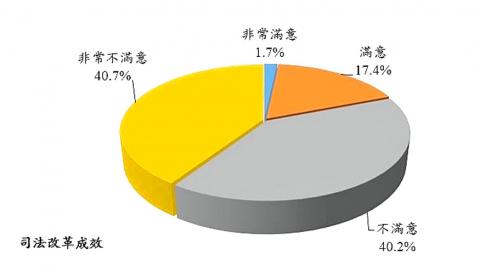Nearly 80 percent of respondents to a poll expressed doubt about the impartiality of judges, while a larger number said they were dissatisfied with judicial reform efforts, a poll released on Friday by National Chung Cheng University’s Crime Research Center showed.
The survey showed that 21.9 percent of respondents said judges conduct trials correctly, down 1.2 percentage points from a previous poll.
The government in August 2017 convened the National Congress on Judicial Reform, but 80.9 percent of respondents expressed dissatisfaction with its efforts.

Photo: Liu Ching-hou, Taipei Times
Asked about countermeasures against false news reports, 81 percent of respondents said they support the government’s use of police and the judiciary, with 49.8 percent expressing strong approval.
Regarding public security, 91.3 percent, a record, said they felt safe in their neighborhoods, while satisfaction regarding public security rose 11.1 percentage points.
The poll showed that 77.5 percent of respondents were satisfied with the performance of police in maintaining public security, also a record, after a crackdown on gangs and weapons in the run-up to the local elections in November last year.
Support for improvements in salaries and welfare for police, firefighters and prison officials was high, with 87.8 percent of respondents approving.
However, when asked about the performance of prosecutors, only 32.3 percent said they were satisfied, including 2.3 percent expressing high satisfaction.
Support for the death penalty was high, with 79.6 percent disagreeing that it should be abolished, including 53 percent who expressed strong disapproval, while 26.6 percent said they disagree, but would be willing to consider other options. Only 15.7 percent supported ending capital punishment.
Meanwhile, 72.6 percent said they were dissatisfied with the government’s performance in tackling corruption, the poll showed.
Regarding the legalization of cannabis, 95.4 percent disagreed that the law should be changed, while 51.4 percent said they were dissatisfied with the government’s performance in drug prevention, but more than half said that fraud prevention was satisfactory.
Asked if they supported rules to make the personal information of sex offenders in their communities public, 72.4 percent said yes, including 45.1 percent who expressed strong approval.
The poll, which was conducted from Jan. 23 to 25, collected 1,802 valid samples and has a margin of error of 2.31 percentage points.
The survey project was convened by center director Yang Shi-lung (楊士隆), with criminology professors Cheng Jui-lung (鄭瑞隆), who is also the dean of student affairs, and Hsu Hua-fu (許華孚) as deputy conveners.

The US government has signed defense cooperation agreements with Japan and the Philippines to boost the deterrence capabilities of countries in the first island chain, a report by the National Security Bureau (NSB) showed. The main countries on the first island chain include the two nations and Taiwan. The bureau is to present the report at a meeting of the legislature’s Foreign Affairs and National Defense Committee tomorrow. The US military has deployed Typhon missile systems to Japan’s Yamaguchi Prefecture and Zambales province in the Philippines during their joint military exercises. It has also installed NMESIS anti-ship systems in Japan’s Okinawa

‘WIN-WIN’: The Philippines, and central and eastern European countries are important potential drone cooperation partners, Minister of Foreign Affairs Lin Chia-lung said Minister of Foreign Affairs Lin Chia-lung (林佳龍) in an interview published yesterday confirmed that there are joint ventures between Taiwan and Poland in the drone industry. Lin made the remark in an exclusive interview with the Chinese-language Liberty Times (the Taipei Times’ sister paper). The government-backed Taiwan Excellence Drone International Business Opportunities Alliance and the Polish Chamber of Unmanned Systems on Wednesday last week signed a memorandum of understanding in Poland to develop a “non-China” supply chain for drones and work together on key technologies. Asked if Taiwan prioritized Poland among central and eastern European countries in drone collaboration, Lin

NO CONFIDENCE MOTION? The premier said that being toppled by the legislature for defending the Constitution would be a democratic badge of honor for him Premier Cho Jung-tai (卓榮泰) yesterday announced that the Cabinet would not countersign the amendments to the local revenue-sharing law passed by the Legislative Yuan last month. Cho said the decision not to countersign the amendments to the Act Governing the Allocation of Government Revenues and Expenditures (財政收支劃分法) was made in accordance with the Constitution. “The decision aims to safeguard our Constitution,” he said. The Constitution stipulates the president shall, in accordance with law, promulgate laws and issue mandates with the countersignature of the head of the Executive Yuan, or with the countersignatures of both the head of the Executive Yuan and ministers or

CABINET APPROVAL: People seeking assisted reproduction must be assessed to determine whether they would be adequate parents, the planned changes say Proposed amendments to the Assisted Reproduction Act (人工生殖法) advanced yesterday by the Executive Yuan would grant married lesbian couples and single women access to legal assisted reproductive services. The proposed revisions are “based on the fundamental principle of respecting women’s reproductive autonomy,” Cabinet spokesperson Michelle Lee (李慧芝) quoted Vice Premier Cheng Li-chiun (鄭麗君), who presided over a Cabinet meeting earlier yesterday, as saying at the briefing. The draft amendment would be submitted to the legislature for review. The Ministry of Health and Welfare, which proposed the amendments, said that experts on children’s rights, gender equality, law and medicine attended cross-disciplinary meetings, adding that